
International Orthodox Christian Charities Ukraine Relief Fund has surpassed their $1 million goal. $1.5 million has been contributed, and they are aiming for $3 million. IOCC is working in Romania, Moldava, Poland and within Ukraine. The need is immense. Please give:
https://support.iocc.org/site/Donation2?df_id=7543&mfc_pref=T&7543.donation=form x
“Man of God”: The Movie about Saint Nektarios
This film was shown in theaters on Monday March 21 and was an unexpected hit, so it will be shown again on Monday March 28. As they say: Check your local listings.
Warning: There is also a crime-mystery movie “No Man of God” showing right now. Don’t be misled. I’ve wondered how many  people came into what they thought was “No Man of God” and were very perplexed to find guys in black robes wandering around chanting “Kyrie eleison”!
people came into what they thought was “No Man of God” and were very perplexed to find guys in black robes wandering around chanting “Kyrie eleison”!
Be sure to arrive on time, since at least where we watched there were no previews of other movies preceding it. (Probably they figured seeing cars blown up and various people in bed together would not be a big sell with this crowd!)
Also be sure to stay for all the credits at the end, because afterwards there are a few minutes more, where the director describes a little miracle which happened during the last days of filming. (Why did they put this after the credits?!)
My review: “Man of God” is well worth seeing. It is moving, inspiring, and accurate history, so far as I know. It shows the inner strength of this humble man who refused to condemn or fight back against his many enemies. Yet, as he said, When “my children” at the women’s monastery were under attack, “now I fight”.
Saints are not born as saints. They have to struggle for it, as surely Nektarios did. I wish that could have been shown somehow, but I guess that part of his life is not known, and in the film he appears fully-formed in deep humility. I also wish the movie had continued into at least the first year after his death. Read my Post below for that.
I think the film’s lighting during the many trials of his life is overly gloomy, and the accompanying music throughout the film pretty odd. (Just my opinion.) The language, by the way, is in English.
It must be because of the film that many are suddenly reading my old Post about Saint Nektarios, so I’ve included it again here for easy access.
91. Saint Nektarios – his life, death and what happened after that

The Third Sunday of Great Lent
As you’ve already been informed a few times, our Lenten Sunday morning Scripture readings were originally aimed towards catechumens in the ancient Church, as they prepared for Holy Baptism at Pascha. They were intended to teach them the most important thing: Who is Jesus? This is something none of us ever dare forget.
Epistle for the Third Sunday of Lent: Hebrews 4:14-5:6
Two chief points:
1 Jesus Christ, our eternal High Priest.
Priests in ancient religions offered sacrifices to placate the gods, to make peace between gods and men. Jewish priests, who inherited their office, offered sacrifices to the one God in the temple in Jerusalem, as directed by Old Testament Law. You remember how the archangel startled the priest Zachariah, father of Saint John the Forerunner, when he went into the inner temple to offer the evening sacrifice of incense. And how when Jesus was forty days old, Joseph and the Virgin Mary went up to Jerusalem so the priest could offer the prescribed sacrifice: “a turtle dove or two young pigeons”.
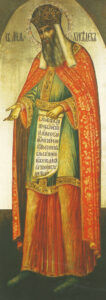 But in that same Jesus we have an eternal High Priest who inherited His office from God His Father, “a priest forever after the order of Melchizedek”. Melchizedek was a mysterious figure mentioned only once in Scripture: “Melchizedek king of Salem [“peace”] brought out bread and wine. He was priest of God Most High, and he blessed Abram, saying, “Blessed be Abram by God Most High, Creator of heaven and earth. And praise be to God Most High, who delivered your enemies into your hand.” Then Abram gave him a tenth of everything.” Genesis 14: 18-20 Melchizedek, a prefiguring of Christ.
But in that same Jesus we have an eternal High Priest who inherited His office from God His Father, “a priest forever after the order of Melchizedek”. Melchizedek was a mysterious figure mentioned only once in Scripture: “Melchizedek king of Salem [“peace”] brought out bread and wine. He was priest of God Most High, and he blessed Abram, saying, “Blessed be Abram by God Most High, Creator of heaven and earth. And praise be to God Most High, who delivered your enemies into your hand.” Then Abram gave him a tenth of everything.” Genesis 14: 18-20 Melchizedek, a prefiguring of Christ.
Icons with permission of Saint Isaac’s Skete: skete.com
Jesus our great High Priest offered the one perfect sacrifice of Himself culminating with the Cross, uniting heaven and earth – peace between God and mankind forever. Just as Melchizedek seemingly appeared out of nowhere, our Lord Jesus came from Heaven. He commanded the Holy Eucharist, Bread and Wine. And He is superior to Abraham, brought a New Covenant, superior to the Old. Just as Melchizedek then was seen no more, Christ has ascended into Heaven. “A Priest forever after the order of Melchizedek.”
2 “What a Friend We have in Jesus”
That’s an old Protestant evangelical hymn. I used to make fun of it. I was wrong. It spoke the truth.
What kind of High Priest is Jesus? One who stands far off in Glory and “lords it over us”? No. Jesus our Lord “sympathizes with our weaknesses” because He “in every respect has been tempted as we are”.
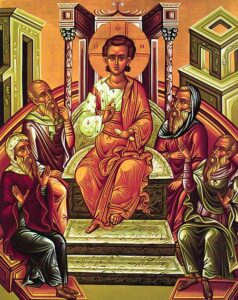 Christ’s public ministry was preceded by His temptations in the wilderness. God only knows what temptations He was subjected to – beyond our imagining. But don’t ever forget that Jesus was fully a Man. He allowed Himseld to be subject to every human temptation. For example, did you ever imagine His years as a teenage boy, with all the temptations they bring? Our dear Lord Jesus subjected Himself even to that.
Christ’s public ministry was preceded by His temptations in the wilderness. God only knows what temptations He was subjected to – beyond our imagining. But don’t ever forget that Jesus was fully a Man. He allowed Himseld to be subject to every human temptation. For example, did you ever imagine His years as a teenage boy, with all the temptations they bring? Our dear Lord Jesus subjected Himself even to that.
Christ (age 12)Teaching in the Temple (Greek Archdiocese)
Dear brother, dear sister: He sympathizes with your weaknesses, because He was, He is one of us. He knows what it’s like. Do not ever fear to turn to Him.
Holy Gospel for the Third Sunday of Lent: Mark 8:34-9:l
This Sunday, half-way through Great Lent, we begin to turn our attention towards the Holy Cross of Our Lord Jesus Christ.
Not only did Christ die for us. He called us to die with Him.
Let’s begin with the Gospel passage immediately preceding this one. Jesus’ disciples had been with Him for some time, and finally He had asked them the big question. “Who do you say I am?” Surely they had been talking about this among themselves. Simon Peter, always impulsive, blurted it out: “You are the Christ, the Son of the living God”. Jesus accepted that title. “Blessed are you, Simon son of Jonah. Flesh and blood have not revealed this to you, but my Father in heaven.”
“So we’ve been right! We are following the Messiah, the King! Now we’ll march with Him into glory!”
Then, for the first time, Jesus began to tell them He must suffer and be rejected and killed, and after three days rise again. I suspect they heard only the forepart of what He said, because the idea of the Messiah suffering and dying was just… well, it was crazy! the last thing they expected to hear, the last thing they wanted to hear. Imagine if one of your heroes announced it was his policy to let his enemies destroy him.
This was worse. Everyone knows the Messiah will come to conquer his enemies, drive out the Romans, establish a Jewish nation. Or those of a more spiritual bent believed the Messiah would drive out the devil and bring in the Kingdom of God.
Jesus is going to die? This wonderful Man whom they had come to know and love and admire and trust? This can’t be right. Peter blurted out again, “No Lord, we will never let this happen to you.” Jesus responded, “Get behind me, Satan. You think as men think, not as God thinks.”
https://www.youtube.com/watch?v=pD6v-FFSaBwAnd there it was.
The apostles must have been horrified, utterly bewildered. Then “He called the people to Him with His disciples and said: “If anyone wishes to come after me, let him deny himself and take up his cross and follow me.”
His “cross”? This was even worse. Everyone knew what a cross was – the Roman way of killing criminals, who were required to carry the cross-bars of their own deaths out to the place where they would be executed. With a shudder they imagined Jesus taking up His cross, being crucified, suffering excruciating pain as He scrambled to breathe, and then dying. Lord, have mercy.
And still worse: I am to take up a cross? Does He mean we are all to be crucified?
The answer is: No, He didn’t, and Yes, He did.
A very few, like the Apostle Simon Peter have actually been crucified. But here Christ was speaking in symbols, as He so often did. He would make His Crucifixion a sign of something deeper.
Let’s say first what taking up our own cross does not mean. It does not mean we should seek to suffer: Oh, hit me again, make me hurt some more. That’s not piety. That’s neurosis, masochism or a martyr complex. That’s not what He meant.
The way of the cross is a symbol of the way of obedience, as Christ was obedient to His Father. He followed God’s will wherever that led Him, from His conception in the womb of the Theotokos, to its culmination on Calvary, and so into His Resurrection. He is the eternal “Lamb, slain from the foundation of the world.” Revelation 13:8
“Lamb of God, You take away the sin of the world, have mercy on us. (2) Lamb of God, You take away the sin of the world, grant us peace.” – from the Roman Catholic Latin Mass. Music by American composer Samuel Barber. Sung by the Philharmonic Choir of Slovenia, “dedicated to the suffering people of Ukraine”.
For us to take up our cross means simply to follow Jesus, obey God as He did through life into death. We also will have some suffering along the way in one form or another. Nobody escapes that. But the way of the cross is not chiefly about suffering, not even chiefly about self-denial and losing yourself.
Listen closely to him: “Whoever desires to save his life will lose it, but whoever loses his life for my sake and the gospel’s will save it.” He is telling us how to gain true life, how to attain lasting joy, how to find our true selves. On the Cross Jesus wasn’t throwing His life away. Look what it led to. And that is what He wants for us. “I came so you might have life and have it abundantly.”
So how to attain life? You save your life by losing it. That sounds paradoxical. It is not. To gain good things in life, to gain joy in life almost always requires sacrifice, suffering, pain, self-denial. To gain long-term fulfillment we often have to sacrifice immediate gratification, as they call it.
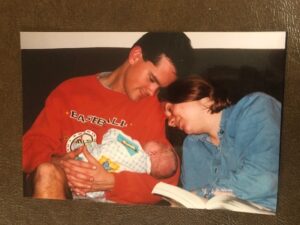 Mothers, to have the joy of a child, first you have to deny yourself and endure suffering and pain, don’t you?
Mothers, to have the joy of a child, first you have to deny yourself and endure suffering and pain, don’t you?
Son-in-law Paul, daughter Jennifer, baby Matthew (who is now 22)
Parents, to raise a respectable family, children who will grow up to love you and do good in the world, you have to deny yourself, sacrifice a lot of money and time and sleep.
If you want good health, you’d better deny yourself drugs and smoking and binge-drinking and driving like a maniac and gobbling down fatburgers. If you’re ill, you may have to deny yourself comfort and undergo painful surgery now, if you want to attain long life. The examples could go on and on. We willingly make personal sacrifices, take up these “crosses”, so to speak, for the sake of long term gain.
So there’s nothing masochistic or negative about what Jesus is saying here. If we know we won’t be here on earth forever, and if we believe Christ’s promise of everlasting life, then here too we sacrifice what is lesser in order to attain what is greater. Even if it hurts, even if it’s hard, and sometimes it is, but the sacrifice is worth it. Let’s list a multitude of examples:
It hurts to give a lot of money to charity and church, when you could be spending it on yourself. It’s a sacrifice to get up and go to Liturgy on Sunday mornings when it would be so nice to snuggle under the covers and sleep in, then have a big breakfast at home. It’s a sacrifice to take some of the money we’d rather spend on ourselves and give it to the needy. It’s hard to be kind to nasty people, not pay them back, when they so obviously deserve it. It hurts, sometimes it’s very hard, to swallow our pride and apologize, or to swallow it and forgive. Or to keep your mouth shut when everybody else is gossiping. Or to tell the truth and do a good job when you could get away with lying and cheating. Or when you know it may even cost you your job to keep your integrity and do what is right and honest, when company policy is otherwise. In so many ways, it requires sacrifice to keep our eyes on the prize and focus ourselves on God’s will and on following Christ. That is our “cross” which we must “take up” willingly, just as Christ took up His Cross.
But if we believe in Jesus Christ, if we believe in eternity, if we want to have Life in the end, then we gladly make these sacrifices. It’s only good sense, truly “enlightened self interest”, as some call it.
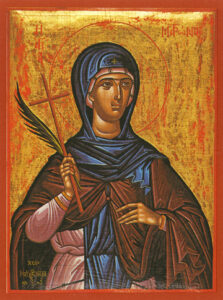 We hear stories of the martyrs day by day. This Sunday: March 27 the Holy Martyrs Matrona of Corinth right, Philetos the Senator, Lydia his wife, Theoprepios and Mekedonos their sons, Amphilochios the Duke and Cronides the Prison Warden, the Martyrs John and Baruch – and a multitude more whose names have been forgotten. These people died not because they enjoyed suffering, but for entirely positive reasons: because they loved Jesus and they would not give Him up, because they valued their integrity and they would not give that up, because they believed in the future joys of Heaven and they would not give those up. The martyrs set their eyes on long term joy rather than immediate gratification. The way of the cross is simply the way of faithfulness, whatever that entails, for the sake of the joy that lies ahead.
We hear stories of the martyrs day by day. This Sunday: March 27 the Holy Martyrs Matrona of Corinth right, Philetos the Senator, Lydia his wife, Theoprepios and Mekedonos their sons, Amphilochios the Duke and Cronides the Prison Warden, the Martyrs John and Baruch – and a multitude more whose names have been forgotten. These people died not because they enjoyed suffering, but for entirely positive reasons: because they loved Jesus and they would not give Him up, because they valued their integrity and they would not give that up, because they believed in the future joys of Heaven and they would not give those up. The martyrs set their eyes on long term joy rather than immediate gratification. The way of the cross is simply the way of faithfulness, whatever that entails, for the sake of the joy that lies ahead.
We’ve been talking about following Christ for the sake of future joy. That’s not the whole story. Fact is most of the time following Christ is not burdensome. “My yoke is easy, my burden is light”, He said. People complained the Son of Man came eating and drinking. Even though He knew what lay ahead, Jesus had much joy in His life.
At the end of today’s Gospel He said: “I tell you: some standing here will not taste death till they see the Kingdom of God come in power.” He was speaking chiefly of His coming Resurrection and Pentecost. But I think it also means that joy in the Kingdom of God is something we can begin to know it now, before we taste death.
As we follow Christ, something wonderful comes alive in us now. We know a deep inner joy now when we draw near to God, when we love people, when we do what is right, when we keep our integrity, when we follow Him through thick and thin. This isn’t “pie in the sky by and by”, as some call it. It begins now.
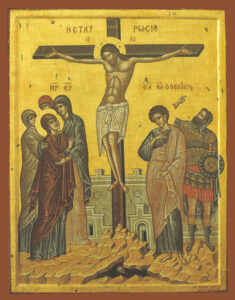
Jesus hanging on the cross, for all the pain, deep in His heart knew that joy. He had been faithful to the end. He had accomplished what He came to do, and He cried from the cross: “It is finished!” I’ve done it! And He closed his eyes in death, His heart at rest. Look: He is not in agony. He is at peace on the Cross. In many Orthodox icons His face has an almost “self-satisfied” expression.
By the nature of things, that kind of faithfulness, that kind of goodness, that kind of integrity, that kind of joy cannot die. It lasts forever into the Kingdom of Heaven.
With His help, we can come to end of our lives still faithful. If we choose, we can come to the end and say with Him: It’s finished. I’ve done it. I never gave up. I’m still following You, Lord. And then we can die with the same deep joy He had on the Cross, which will now go on forever. “On the third day He rose again.” And we can rise with Him if we will.
Listen again to the Troparion of the Cross. Nothing sad and sentimental here. This is a hymn of power, of victory.
On the other said, He also said it negatively: “For what will it profit you to gain the whole world and lose your soul?” Your soul, that deepest inner you, the essence of you – you can lose that. You can go for the externals, money and fame and power and pleasure and popularity and pride and getting your own way – all that stuff the fallen world tells us we must have – and then get to the end of your life, and all you have is the world and it will be: Goodbye, world, and you’ll have nothing to take with you. The true you, the you intended for eternity, your soul will be gone. If you come to the end of life like that, Jesus says, it will be too late. There’s no way to get your soul back then, and “the Son of Man will be ashamed of you when He comes in glory with the holy angels”. Ashamed because of the great gift He gave you, which you just threw away, wasted.
Brothers and sisters, this is tough talk from the Lord Jesus, because this is for Real. As you go through life day by day, hour by hour, you decide your future, whether to save your soul or lose it. Don’t blow it.
Holy Theophany Orthodox Church (OCA) Choir of Colorado Springs, Colorado
As we venerate the Holy Cross of Christ this Sunday morning, we will sing “Before Thy cross we bow down in worship, O Master, and Thy holy Resurrection we glorify.” When you prostrate before the Cross of Christ, you are not doing something morose. You are saying: “Lord, I want to live, I want to save my life. I want joy forever, I want to live with you in the Resurrection. And I know because You told me, I know because You showed me: The Way of the Cross is the way to the Resurrection.”
Next Week: Fourth Sunday of Great Lent: Saint John Climacus – climbing the ladder to Heaven
Week after Next: Fifth Sunday of Great Lent: Saint Mary of Egypt – repentance and Holy Confession